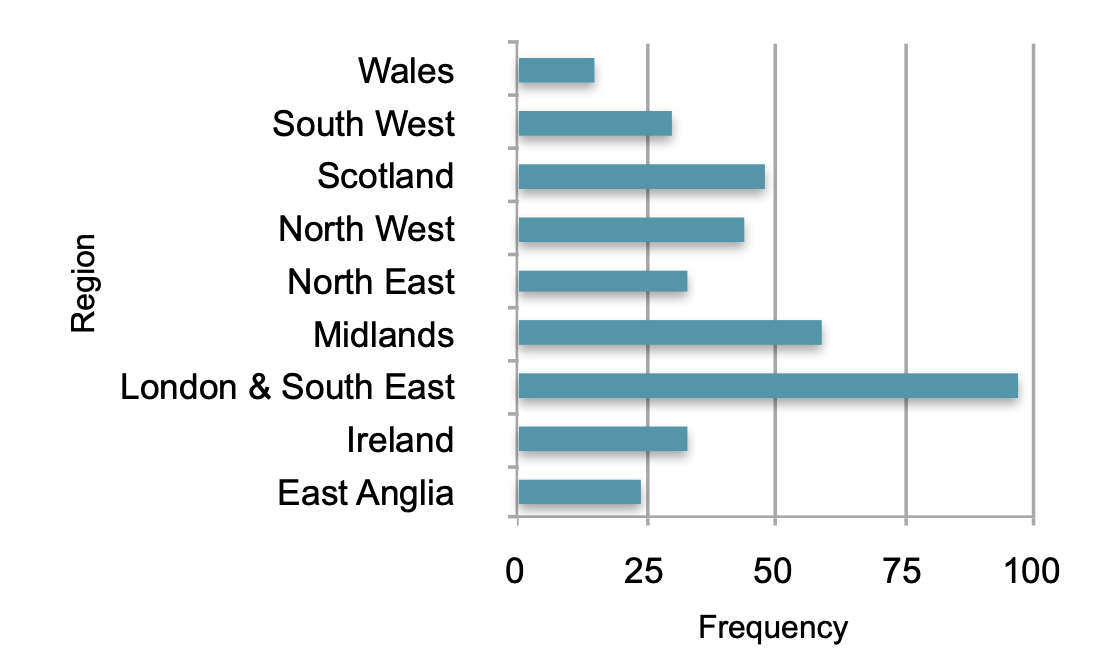Place of Birth
Context
In the literature that mentioned nurses in the Boer War they were usually collectively described as coming from the UK. There was no further breakdown so it was not possible to say whether these nurses had a similar distribution geographically to the UK population of the period, or if one or more regions of the UK contributed more than others. Some of the nurses who went to South Africa from the UK were born elsewhere, but there had been no mention of these in the literature. It was assumed that the nurses who went to South Africa with colonial contingents had been born in these countries. There were also nurses who came from British colonial countries to volunteer for service with the British nursing services.
Data Sources
The main data source for place of birth was the census. As discussed earlier there was sometimes variation in the place of birth although this was usually just within the local geography and would not have affected analysis by region or country. Other data sources included diaries, journals and other ephemera as well as publicly available genealogy data sources.
Data
The place of birth was known for 449 nurses (23%). The majority came from the UK (which at this time included all of Ireland). The frequency by region is shown in the diagram below:
Of the dataset of nurses for whom place of birth was known, 59 were born outside of the United Kingdom, and these are shown below (Country names as they appeared in the Census at that time):
- Argentina 1
- Gibraltar 1
- Palestine 1
- Australia 9
- Holland 1
- Portugal 1
- Belgium 1
- India 18
- Russia 1
- Burma 2
- Jamaica 1
- South Africa 3
- Canada 7
- Java 2
- Spain 1
- Ceylon 4
- New Zealand 2
- Sweden 1
- Germany 1
- Norway 1
Discussion
The distribution of the nurses for whom the place of birth is known closely matched the population demographic of the period. The number of nurses from Ireland may have been underrepresented as much of the census material for Ireland had been destroyed. One particular set of nurses emerged from the data analysis. These were a group of nurses whose birth place and father’s occupation (see below) made each nurse a daughter of empire. Of the 449 nurses in this dataset, 11% were born outside of the UK. Whilst some of these were nurses who were in colonial contingents, the majority were British subjects born while their fathers were serving overseas either in a commercial, diplomatic or military capacity. Two examples of these nurses appear below. One of these was Sister Elizabeth Mabel Bickerdike who continued her military service after the Boer War. The other was Sister Brenda Marie Hoare who was married after the Boer War and who did not appear to have continued either a nursing or a military career after that point.
Sister Elizabeth Mabel Bickerdike ARRC
Sister Bickerdike was born about 1873 in Bombay, India. Her father was an East India merchant. The 1881 Census showed her living with her family in Surrey, England (TNA: RG11 823/39/11) as did the census for 1891 (TNA: RG12 590/132/4) and she was educated at the Girls High School, Croydon. She trained as a nurse at the Infirmary in Bolton, Lancashire, and then worked at the Borough Fever Hospital, Croydon. She enlisted in the PCANSR on the 13th October, 1899 (War Office, 1900).
During the Boer War she served in a number of military hospitals: No.2 General Hospital, Pretoria (TNA: WO 100/229 p.24); No. 5 General Hospital, Wynberg (TNA: WO 100/229 p.45); No. 8 General Hospital, Bloemfontein (TNA: WO 100/229 p.55); and, No. 19 General Hospital, Pretoria (TNA: WO 100/229 p.173).
Image 7: Sister Bickerdyke (with kind permission of her family)
She joined the QAIMNS in 1903 (London Gazette, 1903: p3365) and in February 1903 was in the list of the first 12 nurses to be posted as "Staff Nurses" to the Herbert Hospital, Woolwich. In February 1904 she was posted to the troopship Plassy for "Indian troopship duty" and returned to Woolwich in April 1904. She was posted to Alton and in January 1906 to the Military Hospital, Portsmouth. She resigned in July 1906 and became a private nurse with the Registered Nurses Society.
The 1911 Census showed her working as a hospital nurse at the Mount Vernon Hospital for Consumption, London (TNA: RG14 651). She rejoined the QAIMNS at the start of WW1 becoming an Assistant Matron. She saw service in a number of places. In Egypt, she was at the engagement at Agadir on the 26th February, 1916. She was awarded the Associate Royal Red Cross (ARRC) in 1918 (London Gazette, 1918: p6490).
Sister Brenda Marie Hoare Sister Brenda Marie Hoare was born about 1872 in Kandy, Ceylon (now Sri Lanka). Her father was a coffee plantation owner. He was a member of the aristocratic Irish Hoare family.
The 1891 census showed her living with her mother and siblings in Bournemouth having returned to England to be educated (TNA: RG12 903/56/2).
The 1901 census showed her visiting her sister in Bournemouth and gave her occupation as Army Nursing Sister (TNA: RG13 27/1043/113/14). She trained as a nurse at St Thomas’ Hospital in London. She enlisted in the Princess Christian’s Army Nursing Service (Reserve) on the 16th January, 1900 and served in South Africa (War Office, 1900).
Image 8: St Thomas' Hospital. One of the wards, from The Illustrated London News, April 6, 1895
In April 1903 was appointed as Lady Superintendent of the Afzalgunj Hospital, Hyderabad, Deccan, India. In 1905 she married Charles Henry Dorwald Moberley, himself a ‘child of empire’ having been born in India. They were married in Madras India (Indian Marriage Records 463303). She eventually returned to the UK and was shown in the England and Wales Deaths Index (GRO) for 1939.

